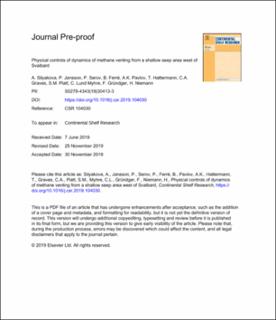| dc.contributor.author | Silyakova, Anna | |
| dc.contributor.author | Jansson, Pär | |
| dc.contributor.author | Serov, Pavel | |
| dc.contributor.author | Ferré, Benedicte | |
| dc.contributor.author | Pavlov, A.K | |
| dc.contributor.author | Hattermann, T. | |
| dc.contributor.author | Graves, C.A | |
| dc.contributor.author | Platt, Stephen Matthew | |
| dc.contributor.author | Myhre, Cathrine Lund | |
| dc.contributor.author | Gründger, Friederike | |
| dc.contributor.author | Niemann, Helge | |
| dc.date.accessioned | 2020-08-06T07:50:47Z | |
| dc.date.available | 2020-08-06T07:50:47Z | |
| dc.date.created | 2019-12-19T09:34:53Z | |
| dc.date.issued | 2019 | |
| dc.identifier.citation | Continental Shelf Research. 2020, 194, 104030. | en_US |
| dc.identifier.issn | 0278-4343 | |
| dc.identifier.uri | https://hdl.handle.net/11250/2671018 | |
| dc.description.abstract | We investigate methane seepage on the shallow shelf west of Svalbard during three consecutive years, using discrete sampling of the water column, echosounder-based gas flux estimates, water mass properties, and numerical dispersion modelling. The results reveal three distinct hydrographic conditions in spring and summer, showing that the methane content in the water column is controlled by a combination of free gas seepage intensity and lateral water mass movements, which disperse and displace dissolved methane horizontally away from the seeps. Horizontal dispersion and displacement of dissolved methane are promoted by eddies originating from the West Spitsbergen Current and passing over the shallow shelf, a process that is more intense in winter and spring than in the summer season. Most of the methane injected from seafloor seeps resides in the bottom layer even when the water column is well mixed, implying that the controlling effect of water column stratification on vertical methane transport is small. Only small concentrations of methane are found in surface waters, and thus the escape of methane into the atmosphere above the site of seepage is also small. The magnitude of the sea to air methane flux is controlled by wind speed, rather than by the concentration of dissolved methane in the surface ocean. | en_US |
| dc.description.abstract | Physical controls of dynamics of methane venting from a shallow seep area west of Svalbard | en_US |
| dc.language.iso | eng | en_US |
| dc.rights | Navngivelse-Ikkekommersiell-Ingen bearbeidelser 4.0 Internasjonal | * |
| dc.rights.uri | http://creativecommons.org/licenses/by-nc-nd/4.0/deed.no | * |
| dc.title | Physical controls of dynamics of methane venting from a shallow seep area west of Svalbard | en_US |
| dc.type | Peer reviewed | en_US |
| dc.type | Journal article | en_US |
| dc.description.version | acceptedVersion | en_US |
| dc.rights.holder | © 2019 Elsevier Ltd. All rights reserved. | en_US |
| dc.source.journal | Continental Shelf Research | en_US |
| dc.identifier.doi | 10.1016/j.csr.2019.104030 | |
| dc.identifier.cristin | 1762820 | |
| dc.relation.project | Norges forskningsråd: 225814 | en_US |
| dc.relation.project | Framsenteret: 66060/299 | en_US |
| dc.relation.project | Norges forskningsråd: 223259 | en_US |
| dc.relation.project | NILU: 113114 | en_US |
| cristin.unitcode | 7460,0,0,0 | |
| cristin.unitcode | 7460,57,0,0 | |
| cristin.unitname | NILU - Norsk institutt for luftforskning | |
| cristin.unitname | Atmosfære og klima | |
| cristin.ispublished | false | |
| cristin.fulltext | postprint | |
| cristin.qualitycode | 1 | |

